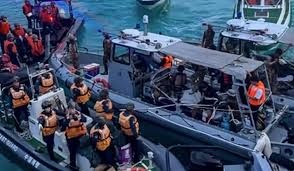Good evening, and welcome to our latest international news update. We bring you the most critical stories shaping global affairs tonight.

South China Sea Standoff: Philippines Accuses China of Deliberate Ramming Near Thitu Island
Tensions in the South China Sea have reached a dangerous new peak after the Philippines formally accused a Chinese vessel of intentionally colliding with one of its ships near Thitu Island (Pag-asa Island). Beijing has vehemently denied the allegations, deepening the diplomatic rift.
According to a detailed statement released by the Philippine Bureau of Fisheries and Aquatic Resources (BFAR), the incident unfolded at approximately 9:15 AM local time on October 12. The Philippine vessel, the BRP Datu Pya, was initially targeted by a Chinese Coast Guard (CCG) vessel using a high-pressure water cannon while operating near Thitu Island, which Manila administers and lies within the disputed Spratly Islands (known as Trường Sa in Vietnam).
The BFAR communiqué stated that a mere three minutes after the water cannon assault, the same Chinese vessel “deliberately rammed” the stern of the Philippine ship. While the incident caused minor structural damage to the BRP Datu Pya, crucially, no injuries were reported among the crew.
The Philippine Coast Guard (PCG) immediately condemned the action as “brazen bullying” and “a clear act of provocation.” They released compelling photographic and video evidence showing the CCG vessel aggressively closing in and deploying its water cannon against the smaller Philippine ship. Despite the extreme provocation, the PCG declared: “We will not be intimidated or coerced into abandoning our waters under our sovereign jurisdiction.”
In a swift counter-statement, the China Coast Guard asserted that the incident occurred because the Philippine vessel had “illegally intruded” into waters near the Subi Reef (known as Zamora Reef in the Philippines), disregarding multiple “stern warnings.” CCG spokesperson Liu Dejun stated that the Philippine ship’s maneuvers were “dangerously approaching,” forcing the Chinese vessel to take “lawful interception and restrictive measures.” He squarely placed the “entire responsibility” for the collision on the Philippine side.
This marks the latest and most volatile incident in a dangerous series of maritime confrontations between the two nations in the South China Sea, a vital waterway responsible for facilitating over 60% of global maritime trade. Previous serious incidents this year include:
In September, a Philippine sailor sustained injuries when a Chinese water cannon shattered the bridge windows of the BRP Datu Gumbai Piang near the Scarborough Shoal.
In August, a Chinese Navy warship was involved in an accidental collision with a CCG vessel while both were engaged in the hot pursuit of a Philippine patrol boat in the vicinity.
Deepening Alliances: Philippines Ramps Up Defense Cooperation
Observers note that this latest aggression underscores the worsening conflict dynamics between China and the Philippines, a situation that persists despite the 2016 Permanent Court of Arbitration ruling that unequivocally invalidated Beijing’s expansive “nine-dash line” claims.
In response to these recurrent Chinese maritime harassments, the Philippines has significantly intensified its defense cooperation with key international allies, most notably the United States.
The two countries conducted a major joint live-fire exercise in May off the coast of Khy Jambells. However, the exercise was later curtailed when the target vessel, the BRP Miguel Malvar, was unexpectedly sunk.
In August, Indian Navy warships were deployed to the South China Sea for a two-day joint patrol with the Philippine Navy. This marked the first time an Indian warship, specifically the guided-missile destroyer INS Delhi, had participated in a joint patrol operation in the region with the Philippine Navy, signaling broadening security ties.

Diplomatic Crisis: South Korea Summons Cambodian Ambassador Over Kidnapping Surge
In a rare and dramatic diplomatic move, South Korean Foreign Minister Chung Eui-yong summoned the Cambodian Ambassador following alarming reports of a spikes in kidnappings targeting South Korean nationals, primarily linked to sophisticated job scam rings operating within the Southeast Asian nation.
According to data presented by South Korean lawmaker Na Kyung-won, the reported cases of South Koreans kidnapped in Cambodia have surged dramatically: from an average of just 10 to 20 incidents per year, the number ballooned to 220 cases in 2024, and has already reached 330 cases by August 2025.
The recent case that sent shockwaves through the South Korean public involved the tragic death of a young South Korean university student, allegedly abducted and subjected to torture by a Cambodian criminal organization. Victims are often lured by false high-paying job offers only to be detained and forced into labor at fraudulent call centers.
The Korea Times reported that during the summoning, Foreign Minister Chung expressed “strong disapproval” and urgently called upon the Phnom Penh government to implement more decisive measures to curb the rampant scams and kidnappings targeting South Korean citizens. This unusual diplomatic escalation reflects the profound severity of the situation and the deep concern in Seoul.
In response, the Cambodian Ambassador affirmed a complete understanding of South Korea’s grave concerns and promised to immediately report the full details to the authorities in his home country. The South Korean government has announced it is working closely with Cambodia to finalize the appointment of an official to oversee the autopsy, which is scheduled for late this month.
The victim, identified only as Mr. A, a 22-year-old student, traveled to Cambodia on the 17th of the month under the pretense of attending an exhibition. A week after his departure, a blackmailer contacted his family, demanding 50 million won (approximately $35,200 USD), claiming the student had caused trouble. The family refused to pay and contacted the police, and communication with the blackmailer ceased four days later. The victim’s body was discovered two weeks later on the 8th of the following month, and his remains have yet to be repatriated, fueling widespread public outrage in South Korea.
Frontier Conflict: Pakistan and Afghanistan Trade Fire at Border
Heavy fighting has erupted along the volatile Pakistan-Afghanistan border after Afghan Taliban forces allegedly launched attacks on Pakistani border posts. This action was described as a direct retaliation for earlier Pakistani airstrikes conducted near the Afghan capital, Kabul.
Pakistani security officials reported that they are engaging with “full force” against what they term “unprovoked shelling” from the Afghan side. The exchange of fire began late on October 11 across more than six border sectors.
The Taliban claims to have seized three Pakistani border posts. Conversely, Pakistani security sources insist their forces have successfully destroyed several Afghan border outposts. Videos shared by Pakistani officials dramatically show artillery and gunfire illuminating the night sky as rounds were fired toward Afghanistan.
Enayatullah Khwarizmi, a spokesperson for the Afghan Ministry of Defense, confirmed the operation was a “retaliatory measure” against Pakistan’s violation of Afghan airspace, stating the attack concluded around midnight local time. Khwarizmi issued a stark warning: “Should the opposing side violate Afghan airspace again, our armed forces are ready to defend our airspace and will respond robustly.”
These serious border clashes occurred one day after the Taliban government in Afghanistan accused the Pakistani military of violating its airspace over Kabul and bombing a market in the Magah region on the night of October 9.
The escalation also coincides with a visit by the Afghan Foreign Minister to India to discuss strengthening diplomatic and economic ties. In a joint statement, the Indian Foreign Minister expressed appreciation for Afghanistan’s strong condemnation of the April attack in Poonch, which had killed 26 people and triggered a separate four-day conflict between Pakistan and India. Islamabad immediately expressed its strong displeasure regarding the joint statement.
Thai Authorities Investigate Allegations of Illegal Israeli Businesses on Koh Phangan
Thai authorities have initiated an investigation into allegations that Israeli nationals are illegally operating businesses on Koh Phangan, following escalating concerns from local residents regarding the growing and sometimes disruptive presence of foreign visitors.
Koh Phangan, a tropical island in the Gulf of Thailand, has been colloquially dubbed “Tel Aviv the Second” by some locals, referencing a major Israeli city. Residents fear that Israeli tourists may be overstaying their visas to establish businesses through illegal nominee arrangements (using Thai citizens as fronts) and are exhibiting disrespectful behavior toward locals and other tourists.
A five-month-old viral video has resurfaced, showing an Israeli female tourist on the island allegedly stating, “My money built your country,” after she was asked to leave a shop for refusing to remove her shoes. The video’s widespread re-sharing in recent weeks has intensified the backlash.
This wave of opposition has spread across social media and independent Thai media, including the “Save Phangan” page, with users expressing outrage that the island is following the path of Pai town in Mae Hong Son province. Pai previously saw a substantial, protracted influx of Israeli visitors establishing businesses and religious centers, some of which sparked a major Thai government investigation earlier this year.
In a proactive measure, the head of the Royal Thai Police, General Kittirath Phanphet, has ordered the police in Provincial Region 8 to collaborate with relevant agencies to investigate the allegations and enforce existing policies. This includes forming a joint task force to scrutinize the land ownership of foreign companies and businesses suspected of circumventing the law.
Police spokesperson Lieutenant General Yingyot Thepjamnong confirmed that preliminary data on Israeli nationals in the Koh Phangan and Koh Samui areas of Surat Thani province indicated multiple arrests for offenses such as operating illegal car rental services, working outside authorized visa limits, running unlicensed businesses, organizing illegal tours, and acting as unlicensed tour guides.
Surat Thani Governor Terus Supavi Bopit acknowledged that while the social media claims have not been officially verified and no formal complaints have been filed, initial checks suggest that “some concerns have basis.” Thai immigration officials are poised to thoroughly review all cases of repeated visa extensions due to suspicions of illegal work or business activities.

Thailand’s New Initiative to Formalize Migrant Workers
In a parallel development, the Thai government announced a new initiative to address labor shortages. Thailand will open a 15-day registration window for an estimated 500,000 to 700,000 undocumented workers from Cambodia, Laos, Myanmar, and Vietnam.
Labor Minister Phiphat Ratchakitprakarn unveiled the initiative following a Cabinet resolution that approved measures to mitigate the labor shortage and bring undocumented workers into the official employment system. This program will allow them to legally reside and work in Thailand for a maximum period of one year.





